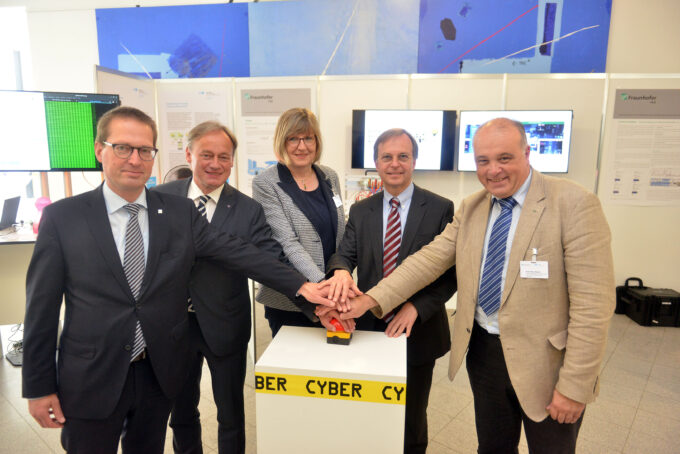High security through the new "Cyber Security Learning Lab
On May 23, Fraunhofer FKIE and Bonn-Rhein-Sieg University of Applied Sciences (H-BRS) opened the joint "Cybersecurity Learning Lab - High Security and Emergency Response" on the Sankt Augustin campus in the presence of the Parliamentary State Secretary at the Federal Ministry of Education and Research.

The new "Cybersecurity Learning Lab" takes on new relevance when one considers the threats posed by cybercrime and industrial espionage. Every year, the German economy incurs 51 billion euros in damage due to data theft, industrial espionage or sabotage. According to a recent report on cyber threats to industrial automation systems, two out of five computers in the industrial environment were affected in the second half of 2016.
Increasing attacks
Attacks on critical infrastructures are also increasingly coming to the fore. "In the Cybersecurity Learning Lab 'High Security and Emergency Response', which starts on 23 May in Sankt Augustin, specialists and managers will receive a compact qualification on the topics of detection, analysis and response to cybersecurity incidents. This takes place in high-quality laboratories with up-to-date IT infrastructure," says State Secretary for Research Thomas Rachel. The Federal Ministry of Education and Research (BMBF) is funding the Fraunhofer initiative, which includes all six learning labs, with an annual sum of six million euros.
The seminars of the Cybersecurity Learning Lab are aimed at public institutions and authorities as well as organizations involved in the defense against or the investigation of computer crimes. Operators of networked IT infrastructures such as building automation systems also benefit from the practice-oriented programs. "With the Cybersecurity Learning Lab 'High Security and Emergency Response', we are making an important contribution to staying one step ahead of cybercriminals," emphasizes Prof. Dr. Georg Rosenfeld, member of the Executive Board of the Fraunhofer-Gesellschaft.
Cooperation
The Fraunhofer Institute for Communication, Information Processing and Ergonomics and the Bonn-Rhein-Sieg University of Applied Sciences are establishing the learning laboratory in close cooperation. 2We develop techniques, procedures and strategies for the high-security sector, especially for public secret protection and for operators of networked IT infrastructures in close cooperation with the neighboring university," explains Prof. Dr. Peter Martini, Institute Director of Fraunhofer FKIE. "The results of our joint research will benefit further education in the cybersecurity learning lab," adds Prof. Dr. Hartmut Ihne, President of Bonn-Rhein-Sieg University of Applied Sciences.
The collaboration is funded by the German Federal Ministry of Education and Research BMBF. The scientists will focus their joint research on efficient tools for the detection of attacks and malware, the analysis of and response to cyber security incidents, the development of security technologies for building automation in smart buildings, and the analysis of the robustness and further development of biometric security methods. The opening of the learning lab will take place in the presence of BMBF State Secretary Thomas Rachel and Prof. Dr. Georg Rosenfeld, Fraunhofer's Chief Technology Officer for Technology Marketing and Business Models.
IoT - rapid response
With the increasing spread of networked microcontrollers and the Internet of Things, e.g. in manufacturing processes, energy supply or building control, corresponding security mechanisms are becoming more and more urgently required in these environments. The researchers are paying particular attention to the human factor in their development and application - the keyword being "usable security". After all, the success factor of security products is their usability. The functionality of security procedures must also be comprehensible to non-experts.
In addition, an essential part of the research work will be the automation of malware analyses for Windows as well as for mobile systems, embedded systems and industrial control systems. Due to the proliferation of new malware, supporting analysts with processes that are as automated as possible is essential. Finally, in addition to the detection and analysis of cybersecurity incidents, the response to such incidents is the third field to which the researchers are devoting themselves. Here, new procedures and tools are being researched to support the so-called "incident response".
A rapid and focused response to a detected cybersecurity incident is important to minimize its impact.
Biometric security
The currently available systems for facial recognition can only detect and ward off deceptions by facial replicas, such as artificial face parts and masks, to a limited extent. In the future, the cooperation partners will use their wide-ranging expertise to evaluate attack methods on biometric security mechanisms, analyze their potential threat, and develop countermeasures.
Preventing a shortage of skilled workers
The learning lab in Sankt Augustin is one of six cybersecurity learning labs that the Fraunhofer-Gesellschaft is currently opening at various locations in Germany. The main aim of the initiative is to improve the qualifications of specialists and managers in public authorities and companies and at the same time to counteract the serious shortage of specialists in the field of IT security. In order not to fall behind in the race against cyber criminals, specialist and management personnel must always be one step ahead of them in terms of knowledge and skills. With a modular, in-service training concept, Fraunhofer institutes and universities of applied sciences bring the latest research findings to the training courses offered by the Cybersecurity Learning Lab. Participants choose the appropriate modules in which they acquire practical security know-how and gain comprehensive qualifications in high-quality laboratories with up-to-date IT infrastructure.
The organization and management of the cybersecurity learning labs is the responsibility of the Fraunhofer Academy, the Fraunhofer-Gesellschaft's continuing education institution.
Further information on the further education programme can be found at www.cybersicherheit.fraunhofer.de









